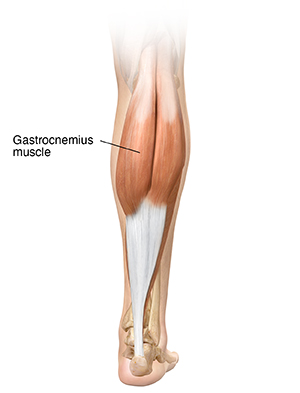Understanding Gastrocnemius Muscle Tear
A gastrocnemius muscle tear is caused by a severe, sudden injury to your calf muscle. This muscle helps flex the lower leg. It also helps you do quick movements, such as jumping and sprinting. An injury to this muscle is sometimes called “tennis leg.”

How to say it
gas-trahk-NEE-mee-uhs
What causes a gastrocnemius muscle tear?
This injury can happen if you make a sudden quick movement that overstretches the muscle. Such movements include jumping or quickly changing direction. People who play sports like tennis or basketball are more likely to suffer such a muscle tear. Exercising too much or not warming up properly can weaken the gastrocnemius muscle.
Symptoms of a gastrocnemius muscle tear
At the time of injury, you may hear a popping sound or feel a tearing sensation in your calf. Other symptoms include:
Treatment for a gastrocnemius muscle tear
Treatment depends on how severe the muscle tear is. The severity will also affect how long it takes to heal. Treatments may include:
-
Rest. Avoid walking or other activities that cause pain.
-
Ice. Putting ice on the injured area may ease swelling.
-
Elevation. Propping up your calf slightly above the level of your heart may ease swelling.
-
Prescription or over-the-counter medicines. These help reduce pain and swelling.
-
Walking boot or crutches. Your healthcare provider may fit you with one of these devices to help you move with less pain.
-
Heel lifts. These are placed inside your shoes. When wearing them, your calf won’t stretch as much, easing pain.
-
Compression sleeve. You may need to wear one of these to decrease swelling and help prevent blood clots in your injured leg.
-
Strengthening and stretching exercises. Certain exercises can help you regain strength and flexibility in your calf.
Complications of gastrocnemius muscle tear
-
Calf weakness
-
Acute compartment syndrome, when pressure builds up in the muscles of the foot and impedes blood flow
-
Deep vein thrombosis, when blood clots form in the veins of the legs
When to call your healthcare provider
Call your healthcare provider right away if you have any of these:
-
Fever of 100.4°F (38°C) or higher, or as directed by your provider
-
Chills
-
Pain that gets worse despite pain medicine and rest
-
Symptoms that don’t get better, or get worse
-
New symptoms
© 2000-2024 The StayWell Company, LLC. All rights reserved. This information is not intended as a substitute for professional medical care. Always follow your healthcare professional's instructions.